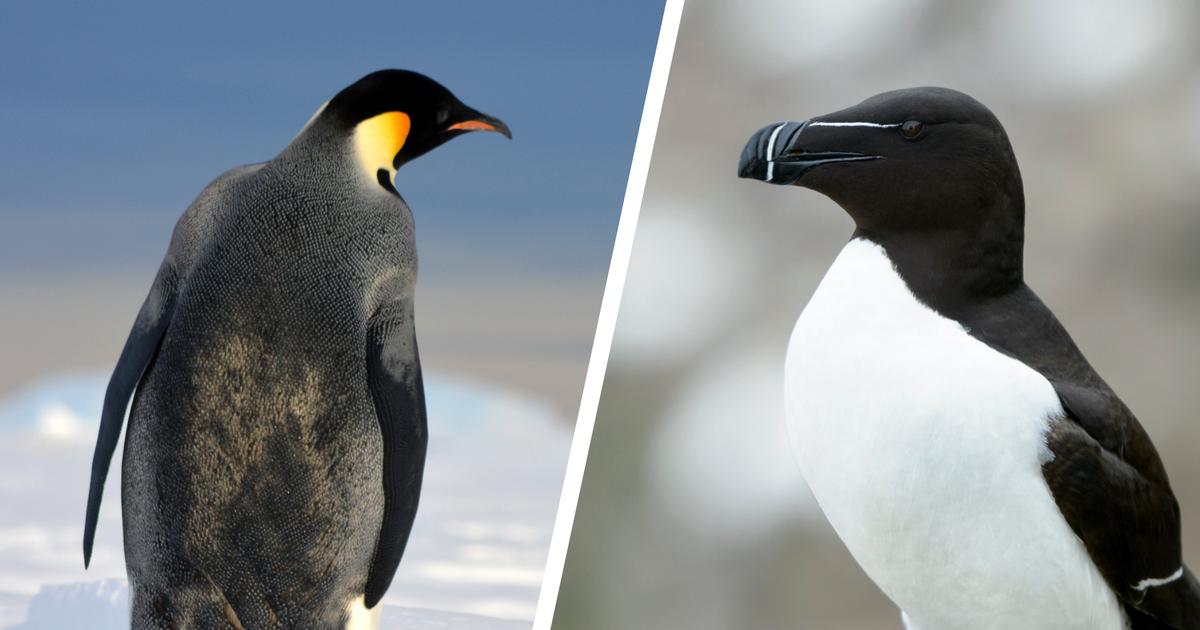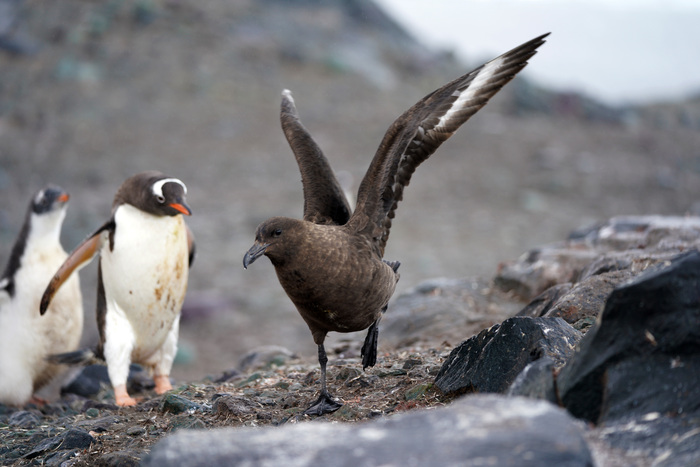Deception Island, in Antarctica, south of the American continent, has among its inhabitants the animals most exposed to human excesses against the environment.
A drastic change in the temperatures of the icy homeland means that the thousands of penguins from the different populations must adapt their behavior to the scarcity of food.
For example, emigrating or taking more risks from other predators.
Every day, an international group of scientists and the military tour this horseshoe-shaped volcanic island to learn the impact of these changes on the individual personality of each penguin.
"Penguin populations are like the canary in the mine in terms of suffering the consequences of climate change," warns Carlos Barros, conservator of birds at the Oceanogràfic de Valencia, from the Gabriel de Castilla Army base, one of the two Spanish enclaves in the area.
The scientist participates in a two-month expedition to Deception Island, within the Perpantar (Antarctic Penguin Personality) project.
The current contingent has 38 people, of which half are scientists from multiple disciplines.
To reach the other Spanish base, the Juan Carlos I, on neighboring Livingston Island, they boarded the oceanographic vessel
Hespérides
.
On the Antarctic Peninsula, expedition members can study in real time how penguins interact with their environment on an individual level thanks to monitoring with digital tracking devices.
Of the different populations of the enclave, they specifically analyze the behavior of chinstrap penguins, with their characteristic black stripe on their heads.
Moment of data collection from a penguin colony by the Perpantar project team in Antarctica. Carlos Barros
For days and kilometers, on land or under the sea, they study their geolocation to find out the migration dynamics due to the scarcity of food in their usual areas and their continuous displacement to other places with more resources.
The objective of the Perpantar project is to know the personality of each individual, to determine their response to climate change and try to alleviate its effects.
The biologist Andrés Barbosa, a great expert on penguins from the National Museum of Natural Sciences (CSIC), was also going to participate in this Antarctic mission, but he died suddenly on January 30 from cancer.
His colleagues highlight his pioneering work, begun in 1994, and miss him as a mentor and friend.
Penguin populations are like the 'canary in the mine' when it comes to suffering the consequences of climate change
Carlos Barros, curator of birds at the Oceanogràfic de Valencia
"Climate change may sound big, but here we see it live," explains Barros.
The researcher points out that penguins "are sentinels of its effects", being on the front line of damage to nature.
"The penguins that inhabit Deception Island feed mainly on small crustaceans," krill, which is very sensitive as an invertebrate to rising temperatures, "so when they disappear it directly affects the entire balance of the polar ecosystem, how many penguin pups will be born or if the colony will be forced to emigrate to other latitudes”, the scientist develops.
Two baby chinstrap penguins in their nest in the Antarctic colony. Carlos Barros
Having offspring is a brutal energy expenditure for the parents of all species.
In the case of chinstrap penguins, parents adapt to the most optimal climate they can find.
In turn, they look for the place that requires the least cost to find food, usually close to where they build the nest where they will deposit the eggs with their young.
Last December, between the 22nd and 24th, just when the Barros mission began at the beginning of the southern summer, taking advantage of the thaw, the thousands of eggs of the couples on Deception Island hatched.
"In penguin colonies, the group serves as a shield for the young, and the central areas usually have an obvious advantage over the peripheral ones, as they are more protected against predators," explains Barros.
The scientist details that the youngest are the ones who are usually on the sides: they must travel kilometers on some occasions to get food, since they have to go out looking for it “yes or yes”.
Predators await them with sharp tusks, such as whales, seals, and killer whales.
"I've even seen
a penguin fly more than six meters, thanks to a wave, escaping from sea lions," Barros narrates with fascination, before explaining how penguins know that if they die their young will too, since no
other
will take care of his offspring.
Chinstrap penguin breeding. Carlos Barros
The novelty of the current stay is the measurement of the behavior of these seabirds.
Beyond the complexity of social interactions within the colony, their individual differences stand out.
“The personality of each penguin influences their chances of surviving climatic stress phenomena, but also to escape from predators.
Who is more daring when it comes to looking for food for their progeny has an impact on whether their offspring live and those genes endure”, says Barros.
The specialist summarizes the Antarctic ecosystem as pure Darwinism: "Evolution selects the one that best adapts to the natural environment."
Bravery, in the case of penguins, is rewarded.
In the Prince Edward Islands (South Africa) is the environmentalist Luis Pertierra, from the University of Pretoria.
The researcher has been studying the effects on distant subpopulations of penguins, such as gentoos, and evaluating their future scenarios in the face of inexorable global change.
The southern ocean is a cradle for life, where biodiversity divides and expands, something that must be protected now
Luis Pertierra, environmentalologist at the University of Pretoria
This expert ecologist, specializing in climate change and invasive species, has previously collaborated with Perpantar researchers in numerous campaigns in Antarctica.
He considers “the southern ocean a cradle for life, where biodiversity divides and expands, something that must be protected now” as he and other researchers write in the scientific journal
Science
.
Pertierra celebrates as an ally the "current pragmatism" that advocates the conservation of habitats as a tangible element to cling to for its own benefit, beyond "love of nature, perhaps too great an element."
"A certain utilitarianism is not bad, I think it is good," says the scientist, to promote the protection of biodiversity.
"Beyond the aesthetic, the extinction of these species will mean a notable loss of services to humanity that are impossible to recover, and knowing what we lose helps to act," he says.
The researcher focuses on the study of the past, to understand how species need "millions of years of evolution to withstand climatic variations", in order to be aware of the limited resilience to the magnitude of the changes that we are experiencing now in a few decades.
You can follow
MATERIA
on
,
and
, or sign up here to receive
our weekly newsletter
.

/cloudfront-eu-central-1.images.arcpublishing.com/prisa/YI4CFNVEDNAVJLDIQIR4RHL2CU.jpeg)

/cloudfront-eu-central-1.images.arcpublishing.com/prisa/GLQIPWOC3VBT3BKZRNAZOQJEQU.jpg)









/cloudfront-eu-central-1.images.arcpublishing.com/prisa/KMEYMJKESBAZBE4MRBAM4TGHIQ.jpg)

